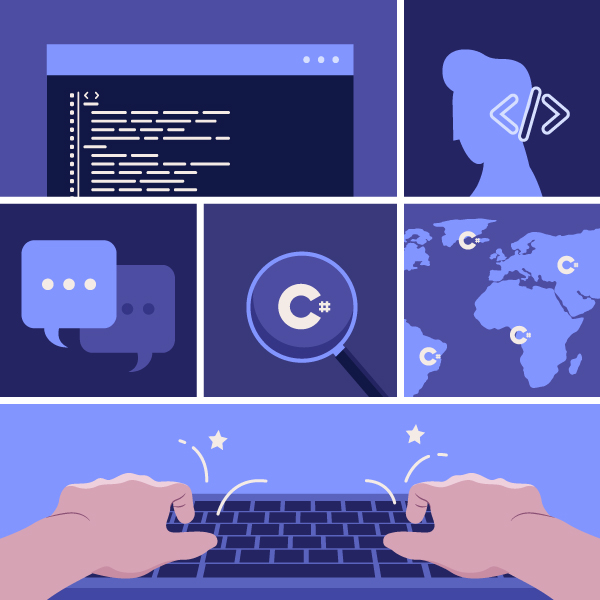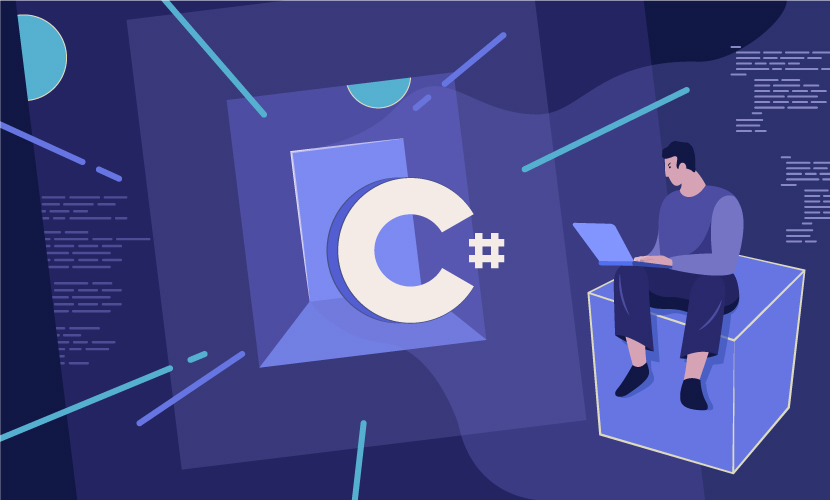Just like you don’t see the pipes but know that the faucet is always going to pour water when the handle turns, C# is something the common web user won’t see but will use through the wealth of applications that are built through this crucial programming language.
For example, ever play a Flash game on the Internet? Of course you have. It likely started in a C#-based development program.
C# and other programming languages are in a weird space in the business world: not everyone understands them thoroughly—some of these people are even responsible for managing programmers—yet they’re critical skills, whether you’re a firm that’s looking for how to give your business a digital edge or if you’re seeking placement in a programmer job market.
No matter what side of this you’re on, we offer the below C# primer to get your feet wet on C# and link to further resources when you’re ready to get started on some programming.


What does a C# programmer need to know and be good at?
Maybe you’re a C# programmer looking for a job and need to know what questions you might get asked in an interview. Or perhaps you’re a project manager and need to find a C# programmer having just been made aware this was a thing in this article you’re reading. Whatever your needs, we’re glad you’re here. Let’s dive into a list of must-have qualifications whether looking for an effective C# programmer to join your team or if you’re looking to become one yourself.
A C# programmer should:
Be Familiar with Related Programming Languages
C# is fairly powerful on its own, but knowing other programming languages will help you deepen your knowledge and extend your work’s functionality. Programmers who’ve worked in C# suggest first getting familiar with Windows Runtime (also known as WinRT) first. The two programming languages share functions that are important tools in a C# developer’s toolbox. Specifically, programmers are wise to mind WinRT’s async and await functions. These are special operators that allow for a range of critical features such as calendar syncing, dialogue box pop ups and web streams. If your development requires web traffic management, it would benefit you as a programmer to know some network programming too, capabilities that can later be deployed through C#. C# allows you to manage the web traffic coming in through TCP (Transmission Control Protocol). Web traffic is exchanged through data that arrives in servings known as “packets” and is received through a port, a point of entry that can be managed through C#.Understand Your Needs and the Pertinent Code
Computer code is a very specific kind of language, and a talented programmer is a kind of bilingual person: someone who is fluent in both spoken and machine language. A good computer programmer needs to be able to translate a firm’s needs in to programming language, and conversely to explain what they’re doing in layman terms so the team understands them, what C# can do, what they can’t do, how long the project will take to complete, etc.Communicate Fabulously with Others
Effective communication is key for any employee and role you’re hiring, but this is especially important in a programmer. This is a position that will not only write the code and programs necessary to execute a firm’s functions, but also will support the staff by writing technical documents and instructions necessary to use these tools.Know Where to Find and How to Incorporate Reusable Code
Because of how widespread C# use is, it’s not likely that whatever you’re building in C# hasn’t been already been made in another existing program. Therefore, there’s a wealth of existing work that a knowledgeable programmer ought to be familiar with. Knowing where to find it and how to draw it in will enable this position to work efficiently.Know the Resources
If you (or the person you’re evaluating for hire) responds with only looks of confusion when you mention common C# forums like Dream.In.Code and C# Forum, or even the straightforwardly named C# Developer Forums, turn and walk, better yet, run in the opposite direction. C# has some of the most active online communities in the world. A good developer ought to know where to find help when they get in a jam.
Where can one learn C#?
We’ve collected some web resources that will be helpful if you need to get familiar with C# or deepen your existing knowledge about the programming language.Tutorials Teacher
This is C# 101. There’s a little programming history there, but only what’s necessary to get you started. This is a great foundational resource.Lynda.com’s C# course
Not only is this going to teach you how to get started in C#, this course includes a pair of fully operational apps to help you get a sense of what you’ll be capable of through this training.C# Station
We introduced C# as an object-oriented language and told you that this means your programming will be allowed to create assets with multiple behaviors and functions. This tutorial is intermediate-level instruction that will help newbies extend their capabilities in this and other object-specific skills.Conclusion
C# is a basic programming language, and it’s also not too difficult to learn. Being easier than it’s cousins C++ and Objective-C, it’s also ubiquitous. The language can be powerful on its own being a higher level language, but more so in combination with the aforementioned cousins (as well as Java). And as a language developed by Microsoft, C# exists in virtually all their products, so there’s no good reason not to learn it. Check out the resources listed above to start building a strong C# knowledge-foundation. (Also remember to get familiar with the existing C# code out there, which can provide you inspiration and shortcuts.) Stick with it for a few months, and sure enough you’ll soon be able to add a new skill to your resume.
Tagged C# developer